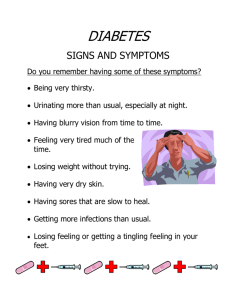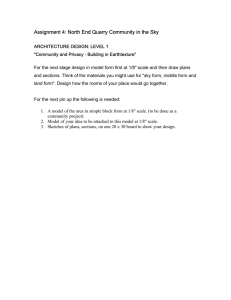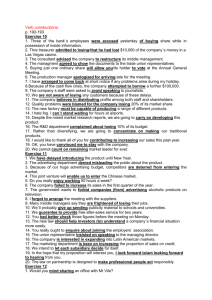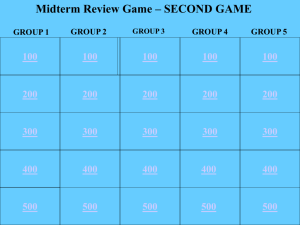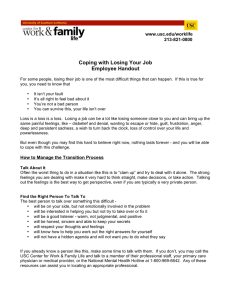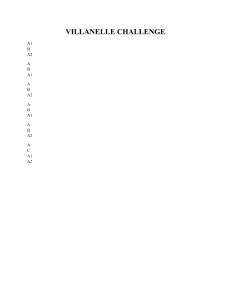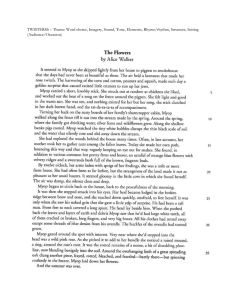Poetry A Brief Review to Flex your Poetic Muscles
advertisement
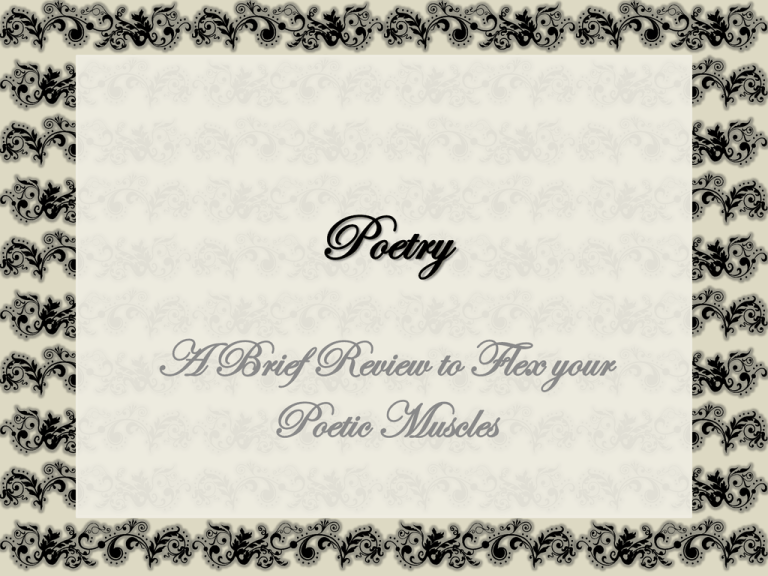
Poetry A Brief Review to Flex your Poetic Muscles As a reminder… Poetry is… A kind of rhythmic, compressed language that uses figures of speech and imagery designed to appeal to our emotions and imagination. Poetry is usually arranged in lines. It often has a regular pattern of rhythm and may have a regular rhyme scheme. Free verse is poetry that has no regular pattern of rhythm or rhyme, though it is generally arranged in lines The major forms of poetry are lyric, narrative, epic, and ballad. Poetic Devices • Rhyme: The repetition of accented vowel sounds and all sounds following them in words that are close together in a poem. • Onomatopoeia: The use of words whose sounds imitate or suggest their meaning. • Diction: A writer’s or speaker’s choice of words. • Rhythm: A musical quality produced by the repetition of stressed and unstressed syllables or by the repetition of certain other sound patterns. • Homophones: Words that sound the same but are spelled differently. Other Literary Terms Frequently Seen in Poetry… o Metaphor: A direct comparison between two unlike things in which one thing is said to be another thing. o Simile: A comparison between two unlike things using like or as. o Alliteration: The repetition of consonant sounds in words that are close together. o Assonance: The repetition of vowel sounds in words that are close together. o Repetition: The repetition of words or phrases to emphasize an idea or to draw attention to a passage. Even More Literary Terms Frequently Seen in Poetry… o Personification: Attributing human characteristics to nonhuman things, such as objects or animals. o Hyperbole: An obvious or intentional exaggeration that is not intended to be taken seriously. o Idioms: An expression unique to a language or culture that means something different from the literal meaning of the words. o Imagery: Language that appeals to the senses. There is a place where the sidewalk ends And before the street begins, And there the grass grows soft and white, And there the sun burns crimson bright, And there the moon-bird rests from his flight To cool in the peppermint wind. Let us leave this place where the smoke blows black And the dark street winds and bends. Past the pits where the asphalt flowers grow We shall walk with a walk that is measured and slow, And watch where the chalk-white arrows go To the place where the sidewalk ends. Yes we'll walk with a walk that is measured and slow, And we'll go where the chalk-white arrows go, For the children, they mark, and the children, they know The place where the sidewalk ends. Shel Silverstein Where the Sidewalk Ends There is a place where the sidewalk ends And before the street begins, And there the grass grows soft and white, And there the sun burns crimson bright, And there the moon-bird rests from his flight To cool in the peppermint wind. Let us leave this place where the smoke blows black And the dark street winds and bends. Past the pits where the asphalt flowers grow We shall walk with a walk that is measured and slow, And watch where the chalk-white arrows go To the place where the sidewalk ends. Yes we'll walk with a walk that is measured and slow, And we'll go where the chalk-white arrows go, For the children, they mark, and the children, they know The place where the sidewalk ends. Shel Silverstein Repetition Where the Sidewalk Ends There is a place where the sidewalk ends And before the street begins, And there the grass grows soft and white, And there the sun burns crimson bright, And there the moon-bird rests from his flight To cool in the peppermint wind. Alliteration Let us leave this place where the smoke blows black And the dark street winds and bends. Past the pits where the asphalt flowers grow We shall walk with a walk that is measured and slow, And watch where the chalk-white arrows go To the place where the sidewalk ends. Yes we'll walk with a walk that is measured and slow, And we'll go where the chalk-white arrows go, For the children, they mark, and the children, they know The place where the sidewalk ends. Shel Silverstein Repetition Where the Sidewalk Ends There is a place where the sidewalk ends And before the street begins, And there the grass grows soft and white, And there the sun burns crimson bright, And there the moon-bird rests from his flight To cool in the peppermint wind. Imagery Alliteration Let us leave this place where the smoke blows black And the dark street winds and bends. Past the pits where the asphalt flowers grow We shall walk with a walk that is measured and slow, And watch where the chalk-white arrows go To the place where the sidewalk ends. Yes we'll walk with a walk that is measured and slow, And we'll go where the chalk-white arrows go, For the children, they mark, and the children, they know The place where the sidewalk ends. Shel Silverstein Repetition Where the Sidewalk Ends There is a place where the sidewalk ends And before the street begins, And there the grass grows soft and white, Alliteration And there the sun burns crimson bright, And there the moon-bird rests from his flight To cool in the peppermint wind. Imagery Let us leave this place where the smoke blows black And the dark street winds and bends. Past the pits where the asphalt flowers grow We shall walk with a walk that is measured and slow, And watch where the chalk-white arrows go Rhyme To the place where the sidewalk ends. Yes we'll walk with a walk that is measured and slow, And we'll go where the chalk-white arrows go, For the children, they mark, and the children, they know The place where the sidewalk ends. Shel Silverstein Repetition Where the Sidewalk Ends TAPS T Topic A Audience P Purpose S Speaker T: P: A: S: One Art -Elizabeth Bishop The art of losing isn’t hard to master; so many things seem filled with the intent to be lost that their loss is no disaster. I lost my mother’s watch. And look! my last, or next-to-last, of three loved houses went. The art of losing isn’t hard to master. Lose something every day. Accept the fluster of lost door keys, the hour badly spent. The art of losing isn’t hard to master. I lost two cities, lovely ones. And, vaster, some realms I owned, two rivers, a continent. I miss them, but it wasn’t a disaster. Then practice losing farther, losing faster: places, and names, and where it was you meant to travel. None of these will bring disaster. -Even losing you (the joking voice, a gesture I love) I shan’t have lied. It’s evident the art of losing’s not too hard to master though it may look like (Write it!) like disaster. T: Losing things. Specifically, losing a loved P: one (most likely a spouse/boyfriend). A: S: One Art -Elizabeth Bishop The art of losing isn’t hard to master; so many things seem filled with the intent to be lost that their loss is no disaster. I lost my mother’s watch. And look! my last, or next-to-last, of three loved houses went. The art of losing isn’t hard to master. Lose something every day. Accept the fluster of lost door keys, the hour badly spent. The art of losing isn’t hard to master. I lost two cities, lovely ones. And, vaster, some realms I owned, two rivers, a continent. I miss them, but it wasn’t a disaster. Then practice losing farther, losing faster: places, and names, and where it was you meant to travel. None of these will bring disaster. -Even losing you (the joking voice, a gesture I love) I shan’t have lied. It’s evident the art of losing’s not too hard to master though it may look like (Write it!) like disaster. T: Losing things. Specifically, losing a loved P: one (most likely a spouse/boyfriend). A: Seems to be specifically written for the S: One Art former spouse/bf. -Elizabeth Bishop The art of losing isn’t hard to master; so many things seem filled with the intent to be lost that their loss is no disaster. I lost my mother’s watch. And look! my last, or next-to-last, of three loved houses went. The art of losing isn’t hard to master. Lose something every day. Accept the fluster of lost door keys, the hour badly spent. The art of losing isn’t hard to master. I lost two cities, lovely ones. And, vaster, some realms I owned, two rivers, a continent. I miss them, but it wasn’t a disaster. Then practice losing farther, losing faster: places, and names, and where it was you meant to travel. None of these will bring disaster. -Even losing you (the joking voice, a gesture I love) I shan’t have lied. It’s evident the art of losing’s not too hard to master though it may look like (Write it!) like disaster. T: Losing things. Specifically, losing a loved P: To express and confirm the speaker’s one (most likely a spouse/boyfriend). ability to survive loss. A: Seems to be specifically written for the S: One Art former spouse/bf. -Elizabeth Bishop The art of losing isn’t hard to master; so many things seem filled with the intent to be lost that their loss is no disaster. I lost my mother’s watch. And look! my last, or next-to-last, of three loved houses went. The art of losing isn’t hard to master. Lose something every day. Accept the fluster of lost door keys, the hour badly spent. The art of losing isn’t hard to master. I lost two cities, lovely ones. And, vaster, some realms I owned, two rivers, a continent. I miss them, but it wasn’t a disaster. Then practice losing farther, losing faster: places, and names, and where it was you meant to travel. None of these will bring disaster. -Even losing you (the joking voice, a gesture I love) I shan’t have lied. It’s evident the art of losing’s not too hard to master though it may look like (Write it!) like disaster. T: Losing things. Specifically, losing a loved one (most likely a spouse/boyfriend). A: Seems to be specifically written for the One Art former spouse/bf. -Elizabeth Bishop P: To express and confirm the speaker’s ability to survive loss. S: First-person, likely the author (Elizabeth Bishop). The art of losing isn’t hard to master; so many things seem filled with the intent to be lost that their loss is no disaster. I lost my mother’s watch. And look! my last, or next-to-last, of three loved houses went. The art of losing isn’t hard to master. Lose something every day. Accept the fluster of lost door keys, the hour badly spent. The art of losing isn’t hard to master. I lost two cities, lovely ones. And, vaster, some realms I owned, two rivers, a continent. I miss them, but it wasn’t a disaster. Then practice losing farther, losing faster: places, and names, and where it was you meant to travel. None of these will bring disaster. -Even losing you (the joking voice, a gesture I love) I shan’t have lied. It’s evident the art of losing’s not too hard to master though it may look like (Write it!) like disaster. Stamp it out! S Subject T Tone A Audience M Metaphor P Point-of-View Fragments -Stephen Dobyns S: T: A: M: P: Now there is a slit in the blue fabric of air. His house spins faster. He holds down books, chairs; his life and its objects fly upward: vanishing black specks in the indifferent sky. The sky is a torn piece of blue paper. He tries to repair it, but the memory of death is like paste on his fingers and certain days stick like dead flies. Say the sky goes back to being the sky and the sun continues as always. Now, knowing what you know, how can you not see thin cracks in the fragile blue vaults of air. My friend, what can I give you or darkness lift from you but fragments of language, fragments of blue sky. You had three beautiful daughters and one has died. for Donald Murray Fragments -Stephen Dobyns S: The effect of a child’s death on the parents. T: A: M: P: Now there is a slit in the blue fabric of air. His house spins faster. He holds down books, chairs; his life and its objects fly upward: vanishing black specks in the indifferent sky. The sky is a torn piece of blue paper. He tries to repair it, but the memory of death is like paste on his fingers and certain days stick like dead flies. Say the sky goes back to being the sky and the sun continues as always. Now, knowing what you know, how can you not see thin cracks in the fragile blue vaults of air. My friend, what can I give you or darkness lift from you but fragments of language, fragments of blue sky. You had three beautiful daughters and one has died. for Donald Murray Fragments -Stephen Dobyns S: The effect of a child’s death on the parents. T: Despairing; powerless to help, but sympathetic A: M: P: Now there is a slit in the blue fabric of air. His house spins faster. He holds down books, chairs; his life and its objects fly upward: vanishing black specks in the indifferent sky. The sky is a torn piece of blue paper. He tries to repair it, but the memory of death is like paste on his fingers and certain days stick like dead flies. Say the sky goes back to being the sky and the sun continues as always. Now, knowing what you know, how can you not see thin cracks in the fragile blue vaults of air. My friend, what can I give you or darkness lift from you but fragments of language, fragments of blue sky. You had three beautiful daughters and one has died. for Donald Murray Fragments -Stephen Dobyns S: The effect of a child’s death on the parents. T: Despairing; powerless to help, but sympathetic A: Specific: Donald Murray General: parents who’ve lost a child M: P: Now there is a slit in the blue fabric of air. His house spins faster. He holds down books, chairs; his life and its objects fly upward: vanishing black specks in the indifferent sky. The sky is a torn piece of blue paper. He tries to repair it, but the memory of death is like paste on his fingers and certain days stick like dead flies. Say the sky goes back to being the sky and the sun continues as always. Now, knowing what you know, how can you not see thin cracks in the fragile blue vaults of air. My friend, what can I give you or darkness lift from you but fragments of language, fragments of blue sky. You had three beautiful daughters and one has died. for Donald Murray Fragments -Stephen Dobyns S: The effect of a child’s death on the parents. T: Despairing; powerless to help, but sympathetic A: Specific: Donald Murray General: parents who’ve lost a child M: The poem is an extended metaphor comparing the destruction of the sky to the way losing a child alters a parent’s reality/world. P: Now there is a slit in the blue fabric of air. His house spins faster. He holds down books, chairs; his life and its objects fly upward: vanishing black specks in the indifferent sky. The sky is a torn piece of blue paper. He tries to repair it, but the memory of death is like paste on his fingers and certain days stick like dead flies. Say the sky goes back to being the sky and the sun continues as always. Now, knowing what you know, how can you not see thin cracks in the fragile blue vaults of air. My friend, what can I give you or darkness lift from you but fragments of language, fragments of blue sky. You had three beautiful daughters and one has died. for Donald Murray Fragments -Stephen Dobyns S: The effect of a child’s death on the parents. T: Despairing; powerless to help, but sympathetic A: Specific: Donald Murray General: parents who’ve lost a child M: The poem is an extended metaphor comparing the destruction of the sky to the way losing a child alters a parent’s reality/world. P: Written from the POV of the author – 1st person, to friend who’s child died. Now there is a slit in the blue fabric of air. His house spins faster. He holds down books, chairs; his life and its objects fly upward: vanishing black specks in the indifferent sky. The sky is a torn piece of blue paper. He tries to repair it, but the memory of death is like paste on his fingers and certain days stick like dead flies. Say the sky goes back to being the sky and the sun continues as always. Now, knowing what you know, how can you not see thin cracks in the fragile blue vaults of air. My friend, what can I give you or darkness lift from you but fragments of language, fragments of blue sky. You had three beautiful daughters and one has died. for Donald Murray William Shakespeare Sonnet 130 My mistress' eyes are nothing like the sun; Coral is far more red than her lips' red; If snow be white, why then her breasts are dun; If hairs be wires, black wires grow on her head. I have seen roses damask'd, red and white, But no such roses see I in her cheeks; And in some perfumes is there more delight Than in the breath that from my mistress reeks. I love to hear her speak, yet well I know That music hath a far more pleasing sound; I grant I never saw a goddess go; My mistress, when she walks, treads on the ground: And yet, by heaven, I think my love as rare As any she belied with false compare. The Death of Santa Claus -Charles Webb He's had the chest pains for weeks, but doctors don't make house calls to the North Pole, he's let his Blue Cross lapse, blood tests make him faint, hospital gown always flap open, waiting rooms upset his stomach, and it's only indigestion anyway, he thinks, until, feeding the reindeer, he feels as if a monster fist has grabbed his heart and won't stop squeezing. He can't breathe, and the beautiful white world he loves goes black, and he drops on his jelly belly in the snow and Mrs. Claus tears out of the toy factory wailing, and the elves wring their little hands, and Rudolph's nose blinks like a sad ambulance light, and in a tract house in Houston, Texas, I'm 8, telling my mom that stupid kids at school say Santa's a big fake, and she sits with me on our purple-flowered couch, and takes my hand, tears in her throat, the terrible news rising in her eyes. Female Author -Sylvia Plath All day she plays at chess with the bones of the world: Favored (while suddenly the rains begin Beyond the window) she lies on cushions curled And nibbles an occasional bonbon of sin. Prim, pink-breasted, feminine, she nurses Chocolate fancies in rose-papered rooms Where polished higboys whisper creaking curses And hothouse roses shed immortal blooms. The garnets on her fingers twinkle quick And blood reflects across the manuscript; She muses on the odor, sweet and sick, Of festering gardenias in a crypt, And lost in subtle metaphor, retreats From gray child faces crying in the streets. Mara Mori brought me a pair of socks which she knitted herself with her sheepherder's hands, two socks as soft as rabbits. I slipped my feet into them as if they were two cases knitted with threads of twilight and goatskin, Violent socks, my feet were two fish made of wool, two long sharks sea blue, shot through by one golden thread, two immense blackbirds, two cannons, my feet were honored in this way by these heavenly socks. They were so handsome for the first time my feet seemed to me unacceptable like two decrepit firemen, firemen unworthy of that woven fire, of those glowing socks. Nevertheless, I resisted the sharp temptation to save them somewhere as schoolboys keep fireflies, as learned men collect sacred texts, I resisted the mad impulse to put them in a golden cage and each day give them birdseed and pieces of pink melon. Like explorers in the jungle who hand over the very rare green deer to the spit and eat it with remorse, I stretched out my feet and pulled on the magnificent socks and then my shoes. The moral of my ode is this: beauty is twice beauty and what is good is doubly good when it is a matter of two socks made of wool in winter. Pablo Neruda Ode to My Socks Edna St. Vincent Millay The Courage That My Mother Had The courage that my mother had Went with her, and is with her still: Rock from New England quarried; Now granite in a granite hill. The golden brooch my mother wore She left behind for me to wear; I have no thing I treasure more: Yet, it is something I could spare. Oh, if instead she’d left to me The thing she took into the grave!– The courage like a rock, which she Has no more need of, and I have. Just in case you were wondering, a brooch is a large decorative pin, usually worn at the neck. Eating Poetry Ink runs from the corners of my mouth. There is no happiness like mine. I have been eating poetry. The librarian does not believe what she sees. Her eyes are sad and she walks with her hands in her dress. Their eyeballs roll, their blond legs burn like brush. The poor librarian begins to stamp her feet and weep. She does not understand. When I get on my knees and lick her hand, she screams. I am a new man. I snarl at her and bark. I romp with joy in the bookish dark. Mark Strand The poems are gone. The light is dim. The dogs are on the basement stairs and coming up. Hate Poem I hate you truly. Truly I do. Everything about me hates everything about you. The flick of my wrist hates you. The way I hold my pencil hates you. The sound made by my tiniest bones were they trapped in the jaws of a moray eel hates you. Each corpuscle singing in its capillary hates you. A closed window is both a closed window and an obvious symbol of how I hate you. Julie Sheehan My voice curt as a hairshirt: hate. My hesitation when you invite me for a drive: hate. My pleasant “good morning”: hate. You know how when I’m sleepy I nuzzle my head under your arm? Hate. The whites of my target-eyes articulate hate. My wit practices it. Look out! Fore! I hate you. My breasts relaxing in their holster from morning to night hate you. The blue-green jewel of sock lint I’m Layers of hate, a parfait. digging from under my third toenail, Hours after our latest row, left foot, hates you. brandishing the sharp glee of hate, The history of this keychain hates I dissect you cell by cell, so that I you. might hate each one My sigh in the background as you individually and at leisure. explain your relational databases My lungs, duplicitous twins, expand hates you. with the utter validity of my hate, The goldfish of my genius hates which can never have enough of you. you, My aorta hates you. Also my Breathlessly, like two idealists in a ancestors. broken submarine. e e cummings [Buffalo Bill’s] e e cummings Buffalo Bill's defunct who used to ride a watersmooth-silver stallion and break onetwothreefourfive pigeons justlikethat Jesus he was a handsome man and what i want to know is how do you like your blueeyed boy Mister Death
